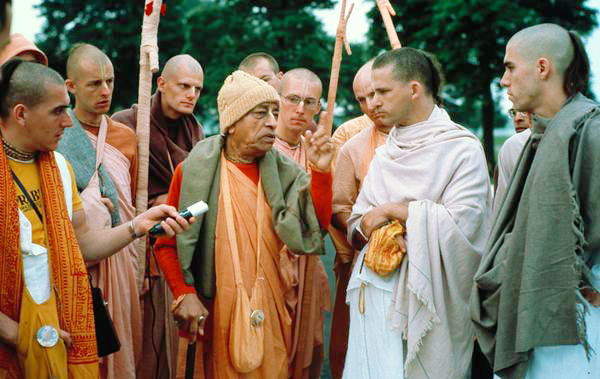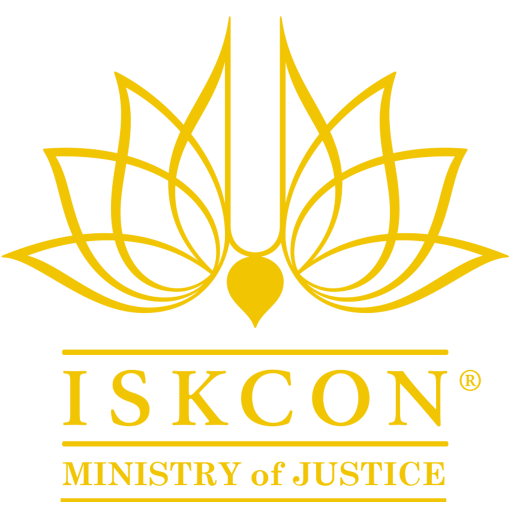- Home
- ISKCON Agencies
- ISKCON Resolve
ISKCON Resolve
About
Srila Prabhupada requested his disciples to cooperate with one another. Differences naturally occur, if for no other reason than there are differing perspectives. But differences do not need to be polarizing. They can be beneficial, especially if we understand the varied points of view from a broad perspective. If we can work out our differences on our own by utilizing available communication and resolution tools, that is clearly desired. When there are no other means for resolution, then it’s best to seek help.

Our Services
ISKCON Resolve provides a neutral, confidential and informal conflict resolution services for members of ISKCON. Chartered by the GBC in 2002, ISKCON Resolve is an independent office providing members an opportunity to discuss concerns with complete confidentiality. We provide the following:
- 1. Ombuds Services: A person to talk to and help you decide how best to deal with your situation.
- 2. Mediation
- 3. Self Help Tools: Tools that can help you and other community members more readily satisfy differences and educate community members about the importance of these processes.
OMBUDS OFFICE
ISKCON Resolve ombuds are fully confidential. Outside of the rare occurance of imminent risk of serious harm to self or others, they will keep all communications with you confidential. Their service provides you with the opportunity to talk to a skilled listener about your concern or problem. You may not want others to know about your situation, or you may fear the consequences of speaking up against someone, or you may just need some information about ISKCON and how it runs, and you don’t know where else to turn for an answer. As trained Ombuds, we will listen to you, and discuss options on how you may wish to address the situation. Often, just having someone listen to you carefully provides you with relief. We are happy to serve you in that way. The Ombuds Office follows the International Ombudsman Associations Standards of Practice and are thus an independent, neutral, confidential and informal resource. Our ombuds are volunteers who are not in ISKCON’s formal line of authority. They do not accept formal complaints or notice for ISKCON. If you wish to make a record, or put ISKCON “on notice”, that is, to make ISKCON formally aware of a particular problem, we can provide information on how to do so.
MEDIATION
The Mediation service provides you with the opportunity to directly confront the issues with the other person, but under the control and guidance of a neutral trained Mediator. The Mediator’s role is to see that both parties get equal opportunity to express their views and guide them towards a mutually agreeable solution. The Mediator is not a judge and will not impose a solution on either party. Rather, they will help the parties come to their own solution.
SELF-HELP
Check out the links to articles on the Brown University Ombuds website. They’re fantastic tools meant to help you manage and resolve conflict.

To bring the members of the Society together with each other and nearer to Krishna, the prime entity.
How to deal with conflicts?
Ways of handling conflict
There are several ways of handling conflicts, and mediation is one of them.
Here’s a list:
- Ignoring it. This method can be the worst choice (though it’s often the one that chosen), but on the other hand there are issues it really isn’t worth the time or the effort. At any rate, sometimes we can “resolve” conflicts just by letting go of them.
- Negotiation. Here, the devotees involved in the conflict try to work out a way to resolve it by talking to each other. The process is voluntary on everyone’s part, and it doesn’t involve a neutral party.
- Mediation. Mediation is actually a lot like negotiation. The difference is that there is a neutral party who guides the process. The process is still voluntary, however; a mediator has no authority to impose a resolution.
- Arbitration or adjudication. Fill in some blurb about the Ministry or the IDRO, or maybe all the offices (CPO, etc)
- ISKCON managers/leaders take a decision. Many conflicts in ISKCON are decided in this way either by a temple president, a nama hatta leader, a zonal supervisor, a senior devotee/siksa/diksa guru, or a GBC member.
Mediation, as we’ve indicated here, is a process of conflict resolution in which the parties (try to) reach a voluntary resolution under the guidance of a neutral third party who has no authority to bind them to any particular outcome. It’s a very informal process. You don’t give “testimony” or present “evidence”; you talk. And it’s amazing how effective that can be.
How does a mediation work?
Here are a few general features that are typically present in any mediation process.
- A short introduction. The mediator will introduce him- or herself, have the parties introduce themselves, and give a short overview of the mediation process.
- Discussing the issues and often what underlies those issues (our values). The mediator will invite each of the parties to describe, in their own words and from their point of view, the nature of the conflict — in particular, the issues each party wants to address, and the interests each party wants to protect, in resolving the conflict.
- Generating possible solutions. The mediator helps the parties stay “on track” in looking for possible ways to address the issues and interests that were set out in step 2.
- Coming to a resolution. At this stage — and a majority of mediations do reach this stage — the parties to the conflict agree to a resolution that they each find satisfactory. Only rarely does this involve any actual compromise; it’s much more common that the mediator helps the parties find some way that all their interests can be satisfied. Ordinarily this happens either by clarifying the interests enough to see that they’re not really in conflict or by “adjusting” them slightly so that the conflict can be resolved.
- Signing an agreement. This is not a step in every devotee mediation, but it can be helpful to memorialize what was decided and remind of the commitments we made during the mediation.
That sounds pretty simple, doesn’t it? The hardest part if often getting devotees to agree to a mediation. When they do, about 75% of the time an agreement is reached. And even when there isn’t an agreement, almost always there is some improvement.
What are the benefits of mediation?
The most important are these:
- The parties keep control. Since mediation is a voluntary process and since nobody has to agree to any specific outcome, that outcome is in the control of the devotees involved themselves. Nobody gets to impose a resolution “from the outside”. And that means . . .
- The resolution satisfies everyone. At least, it satisfies them in the sense that they’re happier resolving the conflict than they would be in continuing it. A trained mediator will help us do better than this; once everybody at the table realizes they’re on the same side in wanting to resolve the conflict, it’s amazing how creative devotees can be in generating solutions that benefit everybody.
- The parties aren’t enemies when it’s over. Ordinarily, parties to mediation come to see that they don’t have to regard each other as enemies.
- Everybody gets a chance to be heard. We sometimes think that if we could just “have our day in court,” we’ll finally be heard. We also sometimes think that once a judge hears what we have to say, the justice of our cause will be so obvious that the other party won’t have a chance. Usually, both of these beliefs are false. You have a much better opportunity to be “heard” in a mediation, and you won’t need to make the other party lose in order for you to win.
- The process is confidential if you want it to be. Your mediator can’t be called to testify or asked by an ISKCON authority about what was said during mediation.
- It’s generally a lot quicker than having an investigation and then a deliberation. In most cases, a mediation last less than a day, often 2 or 3 hours.
Are there any disputes that can't be resolved through mediation?
If mediation is so terrific, why aren’t all disputes resolved this way?
Mediation may be appropriate in many types of conflict. But there are a few things mediation can’t do:
- Punish wrongdoers. Obviously, in a voluntary process, no mediator can suspend someone from ISKCON.
- Set a legal precedent. Since a mediation isn’t a court case, it doesn’t set a legal precedent for future cases. This isn’t ordinarily a concern in most mediations, but it can be, especially as ISKCON sets up it judicial system.
- Correct huge power imbalances. A competent mediator can do a lot to help “level the playing field,” but if there’s a large power imbalance, one party to the mediation may be at a disadvantage and be afraid to speak up for fear of repercussions.
Unless your conflict is of a very unusual sort, mediation is worth considering as a way to resolve it. Whether it’s a family conflict, a dispute with another devotee, or a business matter, mediation may help you construct a tailor-made resolution.
ISKCONResolve has trained mediators in various parts of the ISKCON world, and is willing to train more devotees in this art.
ISKCON Resolve OMBUDSMAN Role & Responsibilities
Ombudsman Role
- An independent and neutral person with whom all ISKCON devotees at all levels may speak confidentially, informally and off-the-record about ISKCON-related concerns or questions.
- Offers a safe alternative for all devotee to discuss concerns and understand their options in a completely confidential* way.
- Facilitates two-way, informal communications to resolve issues that might otherwise escalate into adversarial, time-consuming formal processes.
- Provides training, coaching, and facilitation, when appropriate.
- Serves as an information and referral resource.
- Someone to talk to when you don’t know where to go or with whom you can discuss your concerns.
- Acts neutrally and objectively in all interactions.
- Works to complement, never to duplicate efforts with – or to replace – other available ISKCON resources, such as ISKCON Management, IDRO, Guru Services, Sannyasa Ministry, Leader Misconduct, etc.
Ombudsman Actions
- Clarify the Ombudsman role and services.
- Listen to you without judging you.
- Help you navigate interpersonal disagreements.
- Mediate, or use shuttle diplomacy, when appropriate.
- Ask strategic questions to understand your perspective.
- Provide information about ISKCON policies, options and resources available.
- Promote respectful dialogue and effective communication.
- Help you make informed decisions and think through your next steps.
- Provide training and skill building in conflict management.
Ombudsman Limitations
- Tell people what they should do.
- Take sides in, or form opinions about disagreements and disputes.
- Share information with others without an individual’s permission.
- Take corrective action without permission.
For more information regarding DOI Ombudsman Service, please contact Vraj Vihari dasa, vrajviharidas@gmail.com
*Confidentiality does not apply to instances of imminent risk of serious physical harm.
ABOUT US
The ISKCON Ministry of Justice promotes fairness, accountability, and harmony within the ISKCON community. It ensures ethical governance and supports conflict resolution in alignment with Vedic principles and ISKCON’s spiritual values.
SUBSCRIBE TO NEWSLETTER
Copyright © ISKCON Ministry of Justice 2025. All rights reserved.


